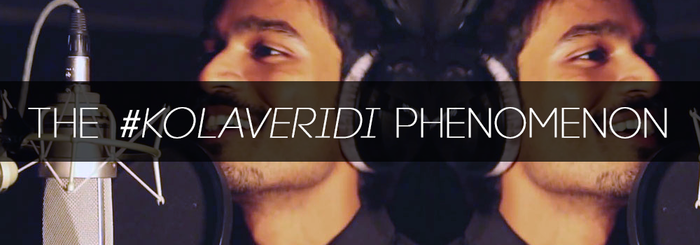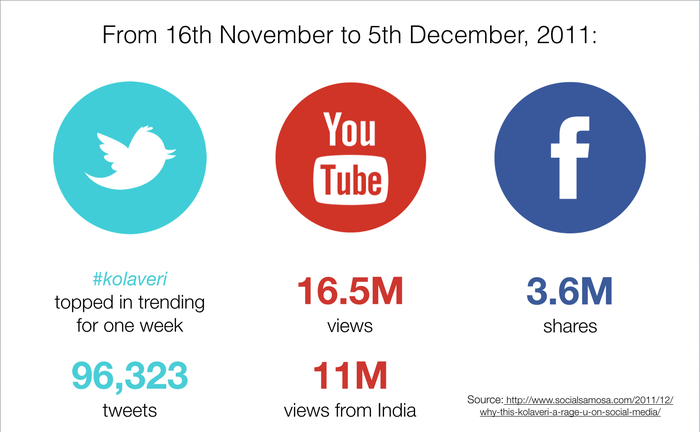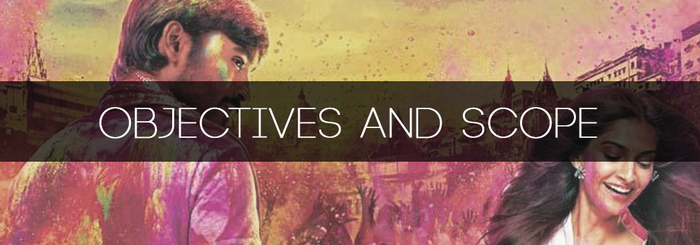Difference between revisions of "Kolaveri Di Social Analytics Project Overview"
Jy.lee.2011 (talk | contribs) |
|||
| (One intermediate revision by one other user not shown) | |||
| Line 20: | Line 20: | ||
<font size =3 face=Georgia > | <font size =3 face=Georgia > | ||
[[File:KD_Project_Motivation.png|700px|center]] | [[File:KD_Project_Motivation.png|700px|center]] | ||
| − | <p> | + | <p>In recent years, with the increasing use of social media, such as Facebook, Twitter, or Instagram, among the Internet users, the connectivity among the users has been subsequently increasing. A number of companies and marketers have been racing to study the potential of social networks and user-created content. “Viral content,” for example, is the epitome of the word-of-mouth effect among the social media users, caused by the large networks formed talking and spreading the content among themselves. A related term “viral video” has also emerged, to describe the phenomenon wherein a video becomes rapidly popular via user-led networks in social media platforms. |
</p> | </p> | ||
<p> | <p> | ||
| − | This project aims to | + | This project aims to do an in-depth research and hands-on analysis on the nature of a user network formed in Twitter, which contributed to the virality of a video. The video is called Why This Kolaveri Di (Tamil: வொய் திஸ் கொலவெறி டி, Why This Murderous Rage, Girl?) – a Tamil music video that went viral in 2011 for its catchy Tanglish (Tamil + English) lyrics. The project aims to evaluate the Twitter dataset related to <i>Kolaveri Di</i>, in order to find out why and how the video went viral and to suggest the implications of such phenomenon with marketing insights. |
</p> | </p> | ||
</font> | </font> | ||
| Line 66: | Line 66: | ||
<p> | <p> | ||
<b><span style="color:#FF91A4">2. Who are the influencers?</span></b> | <b><span style="color:#FF91A4">2. Who are the influencers?</span></b> | ||
| − | :a. Define the influencers in both | + | :a. Define the influencers in both qualitative and quantitative perspective. |
::i. What are the attributes that an influencer should possess? | ::i. What are the attributes that an influencer should possess? | ||
| − | :b. Identify the influencers in the Kolaveri Di network. | + | :b. Identify the influencers in the <i>Kolaveri Di</i> network. |
::i. What are their characteristics like? | ::i. What are their characteristics like? | ||
| − | ::ii | + | ::ii. Are the influencers the same in different time periods? |
| − | + | ::iii. Profile them. | |
</p> | </p> | ||
<p> | <p> | ||
<b><span style="color:#FF91A4">3. What implications does this project have?</span></b> | <b><span style="color:#FF91A4">3. What implications does this project have?</span></b> | ||
| − | :a | + | :a. Summarize the findings and insights from the project. |
| − | :b | + | :b. What are the insights that a marketer or researcher can gain from the findings? |
</p> | </p> | ||
| Line 87: | Line 87: | ||
<p><b><span style="color:#FF91A4">Supervisor:</span></b> Prof. Seema Chokshi</p> | <p><b><span style="color:#FF91A4">Supervisor:</span></b> Prof. Seema Chokshi</p> | ||
| − | |||
| − | |||
<p><b><span style="color:#FF91A4">Sponsor:</span></b> Prof. Srinivas Reddy</p> | <p><b><span style="color:#FF91A4">Sponsor:</span></b> Prof. Srinivas Reddy</p> | ||
Latest revision as of 10:39, 21 November 2014
| Home | Project Overview | Findings & Insights | Documentation | Reflection |
In recent years, with the increasing use of social media, such as Facebook, Twitter, or Instagram, among the Internet users, the connectivity among the users has been subsequently increasing. A number of companies and marketers have been racing to study the potential of social networks and user-created content. “Viral content,” for example, is the epitome of the word-of-mouth effect among the social media users, caused by the large networks formed talking and spreading the content among themselves. A related term “viral video” has also emerged, to describe the phenomenon wherein a video becomes rapidly popular via user-led networks in social media platforms.
This project aims to do an in-depth research and hands-on analysis on the nature of a user network formed in Twitter, which contributed to the virality of a video. The video is called Why This Kolaveri Di (Tamil: வொய் திஸ் கொலவெறி டி, Why This Murderous Rage, Girl?) – a Tamil music video that went viral in 2011 for its catchy Tanglish (Tamil + English) lyrics. The project aims to evaluate the Twitter dataset related to Kolaveri Di, in order to find out why and how the video went viral and to suggest the implications of such phenomenon with marketing insights.
Why This Kolaveri Di was a soundtrack from the upcoming Tamil movie 3, and was written and sung by an award winning actor Dhanush. The song was known for its quirky use of Tanglish (Tamil + English) lyrics, with catchy beats and melody. The video of the song was officially released on YouTube on November 16, 2011, and upon release the hashtag #kolaveri topped in Twitter in Indian trends by November 21, 2011.
The Impact-u
Within a week, the video garnered more than 1.3 million views on YouTube, still trending top in India on Twitter. By end of November, the views increased to 10 million. For more statistics, see below:
It was accoladed with gold medal for the most popular video, silver medal for trending by YouTube, and was named best video song of 2011 by CNN in the end of the year.
The main objective of this project is to find out why and how the video went viral. To further supplement, below is the list of questions to be explored throughout the project.
1. Why did the video go viral?
- a. What are the factors that made Kolaveri Di go viral?
- b. What are the other general factors (or triggers) that can make any content go viral on social media sites?
- c. Are there any networks formed among the users? What are some characteristics of the networks formed? Is it directional or un-directional? Are the nodes involved at individual level or corporate level?
2. Who are the influencers?
- a. Define the influencers in both qualitative and quantitative perspective.
- i. What are the attributes that an influencer should possess?
- b. Identify the influencers in the Kolaveri Di network.
- i. What are their characteristics like?
- ii. Are the influencers the same in different time periods?
- iii. Profile them.
3. What implications does this project have?
- a. Summarize the findings and insights from the project.
- b. What are the insights that a marketer or researcher can gain from the findings?




